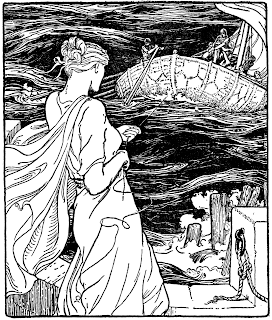I was thinking about the value of a long time scale for fantasy TTRPG adventures, and how it actually ties in neatly with many aspects of old-school style of play:
- Gold-as-xp, and treasure-hunting as the foundational mode of play
- Delves and expeditions
- A slower, more plausible pace of character advancement including training costs for levelling up
- Costs for character death; replacement characters who aren't automatically the same power level as their predecessor
- Emphasis on investing in a base, community, big player-driven projects, and other aspects of the game world
- Social connections, hirelings, delegation, and realm play
- A slower or more 'realistic' time required to recover from injury
Let's say you implement seasonal play, as in e.g. http://udan-adan.blogspot.com/2017/01/the-long-haul-time-and-distance-in-d.html. The PCs have a meagre initial home base. They have some local adventures and make some coin. Enough that they can plan a modest expedition, one that will take months. They come home and spend their wealth, advancing their characters, improving their base, and acquiring the resources for a big expedition, one that will take seasons to complete.
Now let's build on this basis, by adding some game elements to do with character advancement, followers, and character replacement, and see what other common rules might be tweaked.
Character advancement
Character advancement has a cost in looted wealth (e.g., at 1 gp = 1 xp or whatever works with your game rules). Up to half of looted wealth can be used for training; the rest is available for improving the characters' lives and pursuing their goals in other ways.
The requirement that xp must be from looted wealth (e.g. dungeon treasure) ties it back in to the idea that the characters are getting something out of their experiences on delves and expeditions, and also prevents advancement based on capitalism; it feels gamey, but not TOO gamey.
Looted wealth is used to pay for training, tutors, study materials, and so on. Early on, these things are readily available. At higher levels, they might have to be sought out in the world, as it gets harder to find more advanced texts, teachers more skilled than your character, and so on.
Character advancement therefore represents costly, high-intensity learning and study (with an undertone of the character having gone out and had perilous experiences, resulting in both the necessary wealth and the motivation to excel in the training). Advancement takes a long time; let's say a season per level. You could have a more fine-grained system with an increasing time requirement, though.
Followers and character replacement
From say level 2 or 3, players can acquire a number of followers. In D&D-likes, we might say they have followers up to one third of their Charisma score. In those games that already have fleshed-out follower mechanics, you'll need to call them something else or combine the systems.
Followers are just characters like any other, starting at level 1, created with the same character creation rules. They are distinguished from hirelings and other NPCs by an understanding at the table that they are essentially backup PCs; in particular, they won't ever betray the PCs, and they won't be killed 'off-screen' unless the players decided to send them into danger.
Players can invest looted wealth in their followers to advance them, exactly as for their primary PC. This has the same training costs and time and so on. A PC's followers can advance to 1 level lower than the PC and no further.
In-world, followers are squires, apprentices, butlers, bodyguards, family members, and so on. Some of a PC's followers might be their own apprentices (if the same class). But the wizard could retain a loyal housecarl, or the barbarian might have adopted a witch. And some of a PC's followers might be apprentices of other PCs.
The crucial detail for all of this: A player's next character will be drawn from their pool of followers.
If a player's character is safe back home, the player may choose to retire that character, taking all its wealth and social connections and so on with it. If they choose retirement, the player can have some decent portion of the character's experience transferred directly to their followers, including their new character. Let's say, 50% of earned experience, with no more than 20% allocated to any one follower, and no advancement further than the level of the retiring character. Importantly, the old character then becomes a tool of the GM and is kept out of the way, not a free resource for the remaining PCs to hit up at any time.
But if a player's character dies, the player either takes on a new character at starting level or chooses a candidate from their followers.
Tweaking the rules
This framework works best when the cost of character advancement increases drastically with ever level (as in most editions of D&D). That way, a PC isn't terribly disadvantaged by diverting a split of their wealth/xp to maintain a small coterie of backups.
The GM may need to tweak the total size of wealth awards, and/or give a small bonus to any xp allocated to followers (so that it doesn't feel like the current character is losing out). There should be a balance; players should feel a tension between the risk of investing in their PC and the surety of investing in their followers (in case their PC dies).
Different play groups can organise things differently. One player could pick another's follower as a replacement if they agree, and possibly if a bonus/weregild is paid to compensate. Players could trade followers. A group might decide to divert some initial split of their loot into a set of replacement characters, then treat them as a communal resource.
Followers are also a resource in themselves, providing spells and character abilities and so on, giving additional incentive to invest in them. However, in a world where returning from death is cheap and easy, players won't feel as compelled to 'waste' xp on maintaining a pool of followers. The GM might need to make resurrection spells cost additional wealth/xp, or improve the rate of return on follower advancement, to balance it out.
This system would be easily adapted to a playstyle where everyone plays multiple characters at the same time.
What are the benefits?
So going back to that initial list of old-school play elements...
- Gold-as-xp, and treasure-hunting as the foundational mode of play
- Delves and expeditions
This framework, being predicated on plundered gold-for-xp, puts the focus squarely on treasure-hunting. Having a long time frame and big expeditions also helps emphasise the sheer amount of wealth in the adventure location: it's worthwhile planning a trek across the sea, continent, or world for.
- A slower, more plausible pace of character advancement including training costs for levelling up
- Costs for character death; replacement characters who aren't automatically the same power level as their predecessor
This framework achieves these while offering the players a lot of important choices. The long time frame with seasonal expeditions means that there are regular opportunities for the characters to advance via lengthy training without the pace of adventures precluding it, and without the game devolving into fine-grained in-world scheduling puzzles.
- Emphasis on investing in a base, community, big player-driven projects, and other aspects of the game world
Having increasingly huge amount of treasure in more distant and difficult-to-get to dungeons, alongside increasing wealth costs for levelling up, also helps with game world investment. PCs can do social climbing, come up with their own megaprojects, invest in capital, build fortresses, improve their communities, and so on, with the half of their looted treasure that they can't use for character advancement.
Having an expedition 'off season' (winter) creates room to breathe, and for PCs to get entangled in whatever the player finds compelling: planning, hiring, selling treasure, magic item creation, wheeling and dealing, starting a family, capital investment, politicking, dealing with long-term campaign events, and so on.
- Social connections, hirelings, delegation, and realm play
Expedition-based play encourages use of hirelings, and managing a coterie of followers ties in well with managing hirelings and paves the way to realm-based play. Travelling for a long time to an adventure location necessitates retaining staff or paying friends back home to tend to the character's other, broader concerns while the character is off adventuring.
- A slower or more 'realistic' time required to recover from injury
Not everyone cares about verisimilitude, but for those of us who do, the long time scale and the group of followers together permit a GM to tweak rules and powers towards needing long-term recovery. A character who gets injured has the time required to heal up before the next expedition. When a character is knocked out of a delve due to injury, their player isn't sidelined for a session or two; they have followers with them who can go in instead. Or they can attempt the risky proposition of having their PC continue while seriously injured, knowing they have the backstop of having levelled followers back home if 'injured' turns into 'dead' as a result.
...And finally, as the Against The Wicked City article noted, players will have a chance to actually update the age written on their character sheet.







